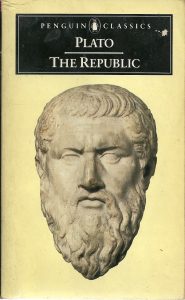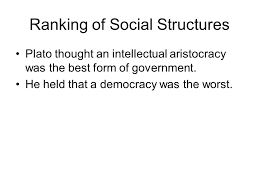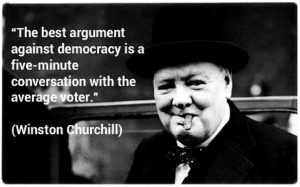The best argument against democracy is a five-minute conversation with the average voter. Winston Churchill
I had a fascinating conversation on Facebook the other day (imagine that!). You may have noticed that we are in the middle of a very polarized political campaign—a Facebook acquaintance posted some data identifying the demographic that is most favorable to Donald Trump and most problematic for Hillary Clinton—white men with no degree. At the time the article was published,  Hillary was doing 14% worse with this group of voters than President Obama did four years ago.
Hillary was doing 14% worse with this group of voters than President Obama did four years ago.
Hillary Clinton and white men without a degree
My Facebook acquaintance and I have never met in person, but we share a couple of important characteristics. Both of us are college professors, and both of us earned our bachelor’s degree from the Great Book curriculum at St. John’s College. We have “liked” each other’s posts before—this time, I took the opportunity to throw something out there that I have frequently taught in the classroom and written about—voting should be considered as a privilege that one earns rather than a right that one is entitled to.
- Me: The elitist in me thinks that the white men no degree problem could be solved by voting being considered as a privilege rather than a right. Everyone should be required to get at least a 70% on the written civics test given to those seeking citizenship in order to earn the privilege of voting.
- Facebook Acquaintance (FA): As an educator, I sadly do not have faith that a civics test would be voting.
Where did I get this ridiculous idea that voting should be an earned privilege rather than a right? It is rooted in the thought of perhaps the greatest philosopher in the Western tradition, as I explained to FA.
- Me: As an educator as well, I get your point. My problem is there is a part of me that thinks Plato is on to something in the Republic. His critique of democracy is that it pretends that everyone is equal—but we know this isn’t true. Very un-American, I know. And I wouldn’t say that only the elite would be voting. Rather, those who have bothered to earn the privilege of voting would be voting. I know many “educated” people who would not pass the test.
 Plato was of the opinion that the proper education qualified a person to participate in government, implying that many people are not capable of successfully completing such an education. FA thought that the problem might lie elsewhere.
Plato was of the opinion that the proper education qualified a person to participate in government, implying that many people are not capable of successfully completing such an education. FA thought that the problem might lie elsewhere.
- FA: I am not sure that many people would care to earn the privilege. Sadly. It is easier to complain and watch the reality TV Trump show. Have you seen the movie “Idiocracy”?
- Me: I haven’t, but can guess from the title what it’s about. I agree that not many people would care to earn the privilege. Which might mean that Plato is right again. Aristocracy in its true meaning—the rule of the best—is the best form of government.
FA’s suggestion that many people might lack the drive or interest to take my proposed voting test illustrates—intentionally or not—one of Plato’s most important points in the Republic. Human beings are not created equal. Some are worthy of being educated to be full participating citizens and some are not. Whether because of lack of intelligence, drive, character, or a combination of these, some people are not capable of being full citizens.  This is Plato’s fundamental critique of democracy—it is rooted in the ludicrously false assumption that all human beings are equal in all relevant ways. They aren’t.
This is Plato’s fundamental critique of democracy—it is rooted in the ludicrously false assumption that all human beings are equal in all relevant ways. They aren’t.
So what does Plato advocate as the best form of government? Aristocracy, understood not as the passing on of power through blood lines as we think of when we hear “aristocracy,” but understood in its original and pure form. Aristocracy simply means “the rule of the best (aristos).” One of the major thrusts of the Republic is a meticulous construction of the perfect community, a community in which each person performs the tasks for which she or he is most naturally suited and which is ruled by the best people in the community. The rulers are identified early in their lives as potential leaders and educated with a view to actualizing the excellence that is latent in them.  The potentials of others are similarly identified early in their lives; accordingly, each person is trained to be the person she or he is most naturally fit to be.
The potentials of others are similarly identified early in their lives; accordingly, each person is trained to be the person she or he is most naturally fit to be.
FA was not having it.
- FA: I don’t think Plato is right. I think people don’t care to earn the privilege because they don’t believe the system will work for them, and because they are so poorly educated because they are poor. It is not a matter of individual failings, but of people being shaped by the system.
There’s a lot in this response. Suffice it to say that FA could be completely right without Plato being wrong. Our current system that has clearly produced millions of disaffected and disillusioned voters is a product of the democratic system, a system that Plato rejects. FA’s insight is that the “system” (society, if you will) shapes the individual—Plato would entirely agree. Our problem is that we have the wrong “system.”
Thirty seconds later FA sent an additional comment that changed the whole discussion.
- FA: As a counterargument to Plato’s Republic, I give you Euripides’ Medea. She definitely would have wanted a vote.
- Me: Good point.
Touché. That’s what I get for getting into this sort of conversation with someone who knows the ancient classics. The title character in Euripides’ Medea is brilliant, powerful, insightful, and effective—exactly what one would want in an informed electorate. She is also vindictive, manipulative, and murders three people (including her two sons) in the play. She’s a bad person, in other words. FA’s point is that what we need is not a test for how informed one is about current events and how government works. In an aristocracy, what is needed is a test to determine who is aristos. And before that, someone to define what aristos even means. Who do we trust to do that and to create the test? I have suggested to my students that I would be willing to do it, but they didn’t seem strongly supportive of my offer.
 Winston Churchill famously said that “Democracy is the worst form of government, except for all those other forms that have been tried from time to time.” Context is important here. After courageously leading Great Britain as Prime Minister through the dark days of World War II, voters rewarded Winston by voting him out of office in 1947. The famous comment was made in Parliament several months later. Democracy is the messiest imaginable way to run things—it might even facilitate the election of Donald Trump as President in November. But every time I work with students to try and devise a better way of doing things, we always come back to the same conclusion. Democracy is a mess, but it is our mess. What are you going to do?
Winston Churchill famously said that “Democracy is the worst form of government, except for all those other forms that have been tried from time to time.” Context is important here. After courageously leading Great Britain as Prime Minister through the dark days of World War II, voters rewarded Winston by voting him out of office in 1947. The famous comment was made in Parliament several months later. Democracy is the messiest imaginable way to run things—it might even facilitate the election of Donald Trump as President in November. But every time I work with students to try and devise a better way of doing things, we always come back to the same conclusion. Democracy is a mess, but it is our mess. What are you going to do?











